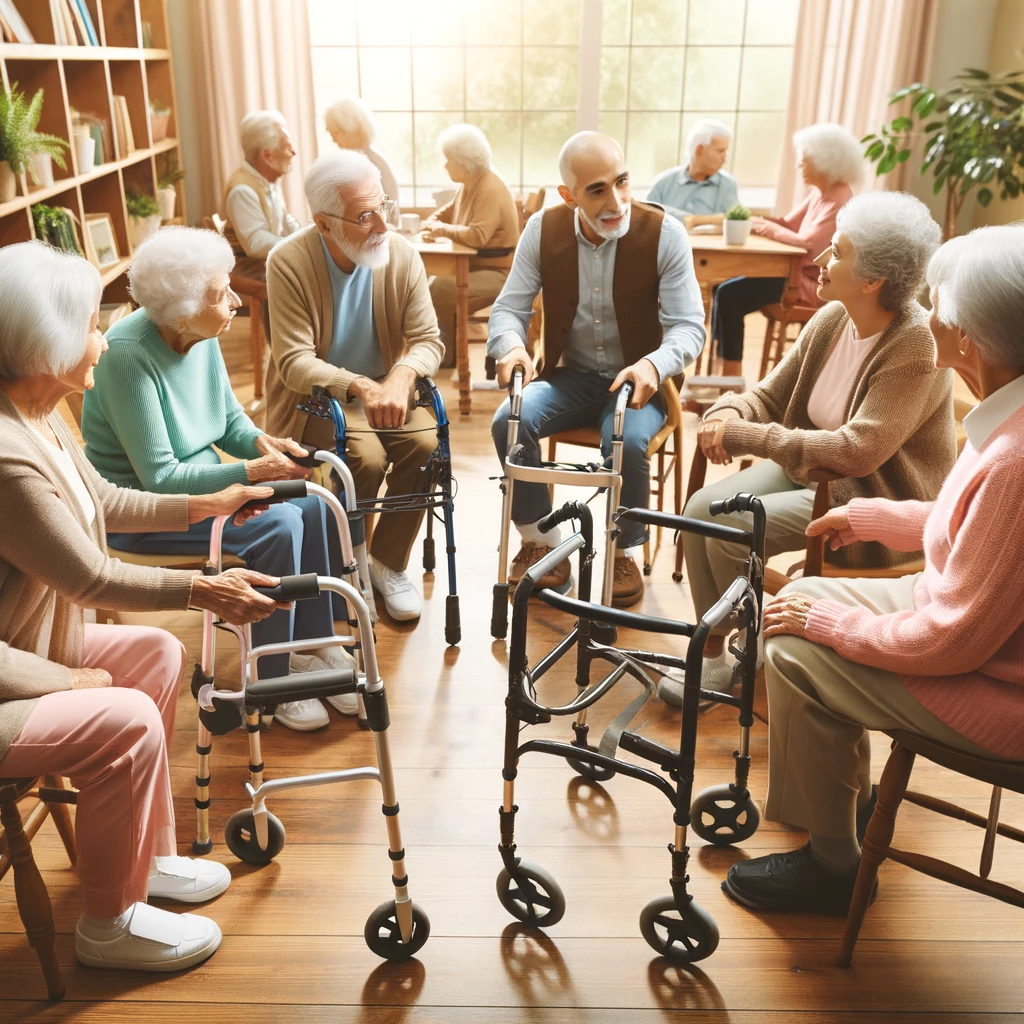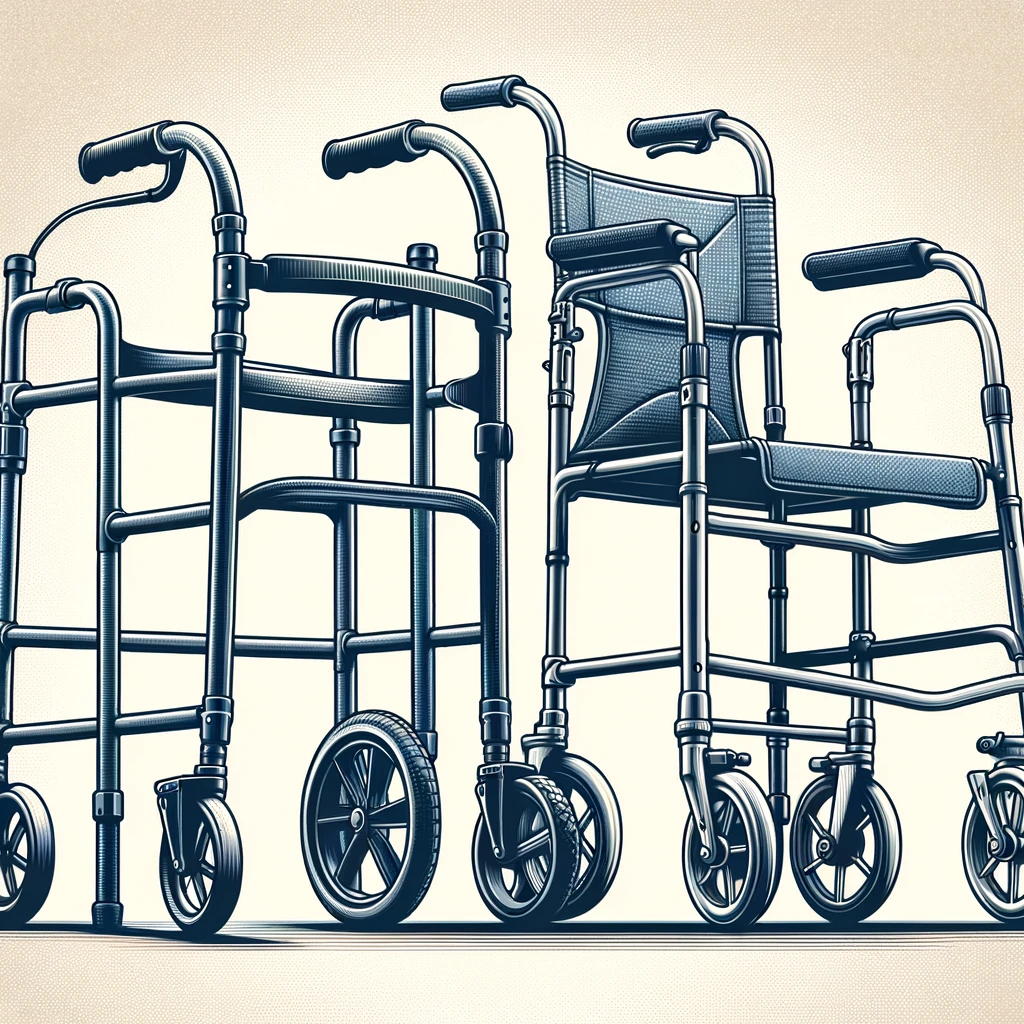Where to Find Used Walkers for Seniors?
Where to Find Used Walkers for Seniors?
The journey towards aging gracefully often requires the assistance of mobility aids, among which walkers stand out as a significant support for seniors. These aids not only enhance the ability to move independently but also significantly reduce the risk of falls, thereby improving the quality of life. However, the cost of new walkers can be prohibitive for some, making used walkers an attractive and viable alternative. Opting for a used walker not only proves to be cost-effective but also aligns with the principles of environmental sustainability by reusing and recycling equipment. This guide aims to navigate readers through the process of finding reliable sources for used walkers for seniors, ensuring they can secure a mobility aid that is both affordable and suitable for their needs.
Understanding Walkers for Seniors

Walkers are not one-size-fits-all; they come in various types to meet different mobility needs. The most common types include standard walkers, which require the user to lift and move the walker forward with each step; rolling walkers, which have wheels and allow for a smoother movement; and walkers with seats, which provide a convenient resting spot. When considering a used walker, several factors should be taken into account, such as the walker’s weight capacity, height adjustments to suit the user, portability for easy transportation, and additional features like baskets or trays for convenience.
Before making a purchase, consulting with a healthcare professional is crucial. They can offer guidance based on the senior’s health condition, mobility level, and overall needs, ensuring the chosen walker will provide the appropriate support.
Trusted Online Marketplaces
The digital age offers the convenience of finding used walkers for seniors through various online platforms. Here are some trusted marketplaces to consider:
- eBay: This global marketplace provides a wide selection of used walkers. When shopping on eBay, look for sellers with high ratings and positive reviews to ensure reliability. Reading product descriptions carefully and asking the seller questions about the walker’s condition can also help secure a good purchase.
- Craigslist: For those who prefer to inspect the item before buying, Craigslist offers local listings of used walkers. Ensure safe transactions by meeting in public places and inspecting the walker thoroughly for any signs of damage or wear.
- Facebook Marketplace: Leveraging social networks, Facebook Marketplace connects local sellers and buyers. It’s a great platform to find used walkers in your community. Check the seller’s profile for credibility and reach out directly to negotiate and inquire about the walker’s history.
When using online marketplaces, patience and diligence in researching and communicating with sellers can lead to finding a great deal on a used walker that meets your needs.
Local Resources and Community Centers

Beyond the digital realm, local resources can be invaluable in the search for used walkers. Senior centers and community organizations often have information on where to find mobility aids or may even offer them for loan or sale. Thrift stores, consignment shops, and medical resale shops frequently have used walkers at affordable prices. It’s worth visiting these stores periodically as their inventory can change.
Hospitals and rehabilitation centers sometimes donate used walkers or sell them at a low cost. Contacting these facilities can provide leads on where to find used walkers.
In the next sections, we’ll explore nonprofit organizations that assist with mobility aids, provide tips for inspecting a used walker, and discuss maintenance and safety precautions.
Nonprofit Organizations and Charities
Several nonprofit organizations and charities are dedicated to providing mobility aids, including used walkers, to seniors who need them. These organizations often operate through donations and grants, offering equipment at little to no cost to those who qualify. Here are some avenues to explore:
- The Senior Mobility Initiative: This program often collaborates with local agencies to provide seniors with mobility aids, ensuring they maintain their independence and quality of life.
- Goodwill and The Salvation Army: While primarily known for their thrift stores, these organizations occasionally receive donations of walkers and other mobility aids. They offer these items at a significantly reduced price, making them accessible to those on a tight budget.
- Medical Loan Closets: These are community-based programs that lend medical equipment, including walkers, to individuals on a temporary basis. While the equipment is typically loaned out, it can be an excellent solution for seniors needing a walker for a short period.
To benefit from these resources, seniors or their caregivers should contact these organizations directly to inquire about availability and eligibility criteria. It’s also beneficial to connect with local chapters or offices, as they may have more specific information or additional resources tailored to the community’s needs.
Tips for Inspecting and Choosing a Used Walker

When considering a used walker, conducting a thorough inspection is crucial to ensure it meets safety and mobility needs. Here are some tips to guide you through the process:
- Check for Structural Integrity: Inspect the walker for any signs of damage, such as bends, cracks, or significant wear and tear. The frame should be sturdy and free of any defects.
- Test the Moving Parts: If the walker has wheels, make sure they roll smoothly and the brakes (if any) function correctly. For folding walkers, ensure the mechanism works seamlessly without sticking.
- Look for Cleanliness: While used walkers can be cleaned, starting with one that has been well-maintained can save effort and ensure better hygiene.
- Adjustability: Verify that the walker’s height can be adjusted and that it can be set to a comfortable level for the user. This ensures proper posture and reduces the risk of strain.
- Consider Future Needs: Consider any additional features that might be needed down the line, such as attachments or accessories, and ensure the walker can accommodate these.
Taking the walker for a ‘test drive’ is also advisable, allowing the senior to ensure it suits their mobility needs and is comfortable for use.
Safety Precautions and Maintenance
Ensuring the used walker is safe and well-maintained is paramount for the user’s safety. Here are some safety precautions and maintenance tips:
- Regular Checks: Periodically inspect the walker for loose screws, worn-out wheels, or any signs of damage. Immediate action should be taken to repair or replace faulty parts.
- Cleaning: Keep the walker clean by wiping it down regularly with disinfectant, especially the handles and any areas that come into frequent contact with the user.
- Professional Maintenance: For complex walkers, such as those with brakes and mechanical parts, consider having them serviced by a professional if you’re unsure about proper maintenance.
Proper maintenance not only extends the life of the walker but also ensures it remains a reliable support for the senior.
Conclusion to Used Walkers for Seniors
Finding a used walker for a senior can be a fulfilling journey significantly contributing to mobility and independence. By exploring online marketplaces, local resources, and nonprofit organizations, and following through with diligent inspection and maintenance, caregivers and seniors can secure a mobility aid that is both cost-effective and functional. Remember, the right walker can transform daily life, offering freedom and safety to those who value their independence. Patience, research, and attentiveness to the user’s needs are key in finding the perfect used walker that meets these criteria.
Helpful Resources and Links
For additional information and resources on finding and choosing walkers for seniors, consider visiting:
- eBay, Craigslist, and Facebook Marketplace: Start your search with these online platforms for a wide selection of used walkers.
- The Senior Mobility Initiative and Medical Loan Closets: Reach out to these organizations for assistance in obtaining a walker.
- Consumer Safety Guides: Look for online guides on walker safety and maintenance to ensure you’re well-informed.
Embarking on the quest for a used walker with the right knowledge and resources at your disposal will make the process smoother and more rewarding, ensuring the senior in your life continues to move forward with confidence and support.
See our other article on walkers!
Upright Walkers for Seniors #1 Guide
Upright Walkers for Seniors – 2024 Best 5 Review
Best Walkers for Seniors on a Budget
Rollator Walkers vs Regular Walkers, what’s best in 2024?
Walkers for Adults: Great Mobility in 2024
Walkers for Seniors: Our Complete Guide
Three Wheel Walker: #1 Best Picks & Buying Tips for Seniors
Drive Walker with Seat for Seniors – Top 5 in 2024
Upright Walkers for Seniors – 2024 Best 5 Review
JustforSeniors.org – Health & Wellness

